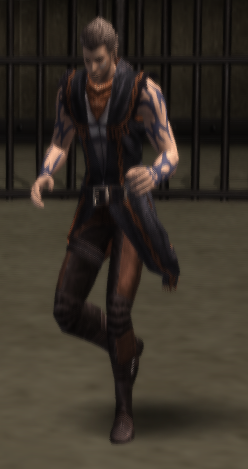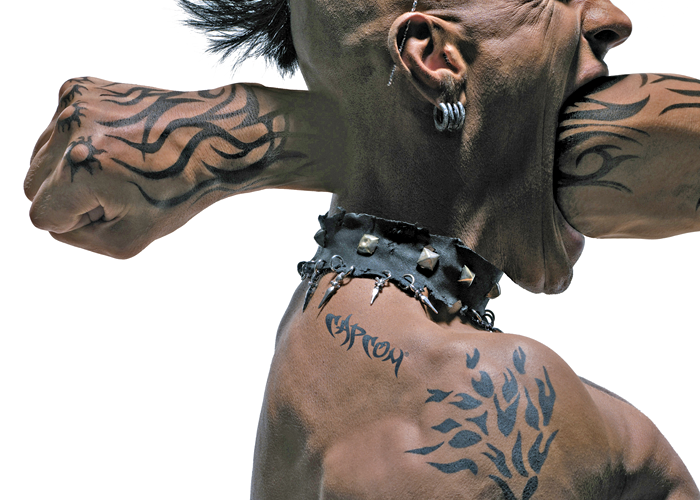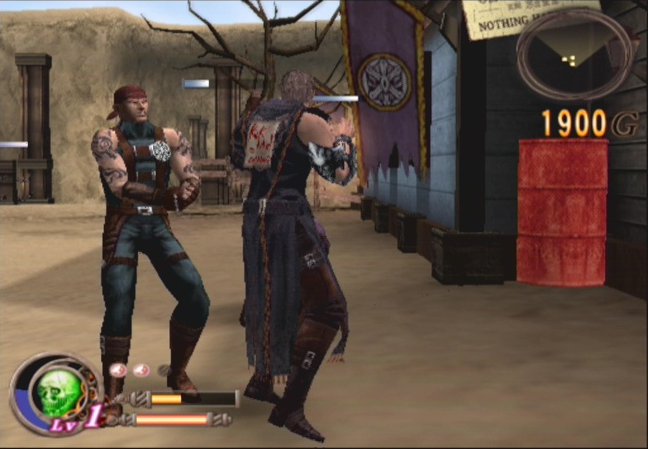

The slightest of errors will be punished in the most harsh of ways: if the player manages to progress to level 3 or level Die!, the slightest mistake can mean a game over.

None of this matters, however, once the entire aesthetic of the game gets its hooks into the player: a zen-like state has to be acheived in order that any real progression be made in the game. Yes, God Hand is a little ugly to look at with its bland textures and habit of having walls clip away as the camera rotates. Thankfully, use of the God Hand can dispose of them quickly. This is a simple system, however, that is rife with hidden depth. Add in the ability to purchase and find in-game new techniques to use in combat and there is even further scope for variety within what is, on the face of it, a fairly simple combat system. Knowing that there is more challenge waiting for the player when they have come to “master” the game at level one ensures that there is something to keep coming back for and prevents the game getting stale at any point. Upon reaching a higher level, it is not just a simple case of enemies hitting harder and living through more abuse, but their behaviour is also altered: whether or not they attack becomes less contingent upon where the camera is facing and the sorts of attacks that they use will change. The level of the player is used to show the real difficulty of the game, above the initial selection of easy or normal: this adaptive difficulty increases with good play and decreases when the player is hit by their opponents. While it may not be unreasonable to think that it would be an RPG-like indicator of player character progression that increases with the defeats of enemies, it is something far more interesting than that. Upon a first play of the game, having not made reference to the instruction manual, it seems unclear what the purpose of this is.

At the bottom left of the screen in-game, there is a readout of a level. The tight controls and unique dodging system are by no means the sole reasons for the game being as compelling as it is to play. The scope for gaining satisfaction from pummeling enemies is near endless. This game is an archetype of design that rewards failure by giving the player the tools (in the form of understanding of the game’s mechanics) to succeed in the future. Unsurprisingly, given Shinji Mikami’s work with Resident Evil 4, the control of the game is wonderfully tight with any error made by the player never being the fault of controller input delay but always being that of the player themselves: this fact in combination with the dodge mechanic employed by the game (whereby a quick flick of the right analogue stick results in the player character performing a variety of acrobatic manoeuvres to get out of the way of an attack) means that in spite of the incredible difficulty that a new player will have with the unapologetically tough first level of the game, there is always a sense that the game can be learned and mastered by someone merely willing to give it the time it more than deserves. Far more interesting, however, are the mechanical twists from expected norms that transform the game from what would have been a fairly generic-yet-competent entry in the PlayStation 2 catalogue to the sleeper classic that it is. Narratively, the twist comes in the fact that, for a variety of convoluted reasons, you have actually come to possess the right arm of a God and your human frame. The premise is simple enough, and was something that had seen before plenty of times prior to God Hand‘s release: you’re a guy you need to get somewhere a variety of enemy combatants stand between you and your destination you have fists and therefore both can and will punch your way to your destination. To think that this reviewer’s opinions may well have led to the lacklustre commercial performance of what is a wonderful game and thereby perhaps even the closure of Clover studios boggles the mind to be so hard on a game that’s play mechanics are defined by a fairly lengthy learning curve for reasons that seem to be rooted in simply not giving the game enough time to grow on the player and adapting to its firm-but-fair no-nonsense approach to combat beggars belief. IGN, bastion of good taste and integrity though they may be, saw fit to award the game a meagre 3/10 at a time when eights and nines were being handed out freely for the most mediocre efforts. God Hand’s release must have been ill-timed: it did not receive much in the way of critical recognition upon its being unleashed upon the market. Enemy design is stellar, if a little eccentric at times.


 0 kommentar(er)
0 kommentar(er)
